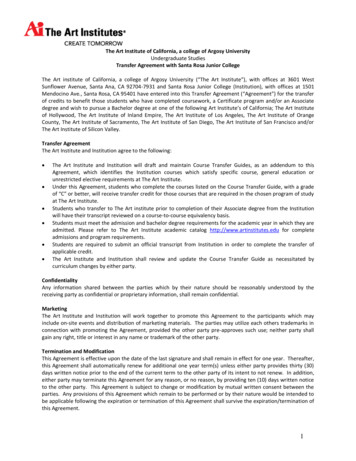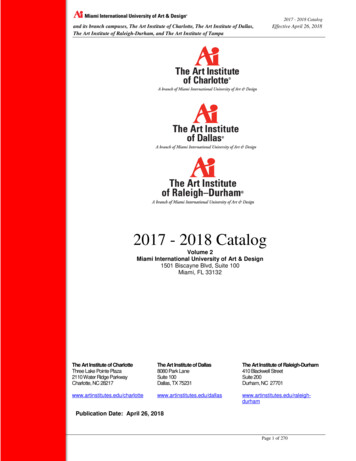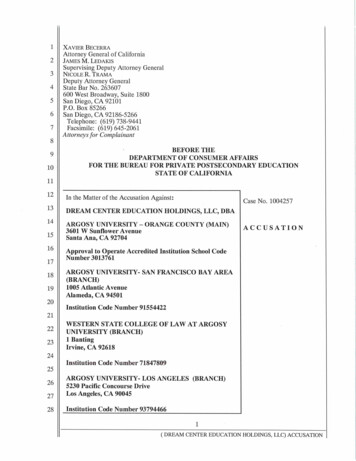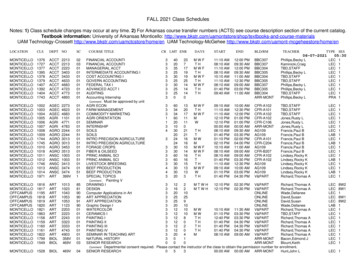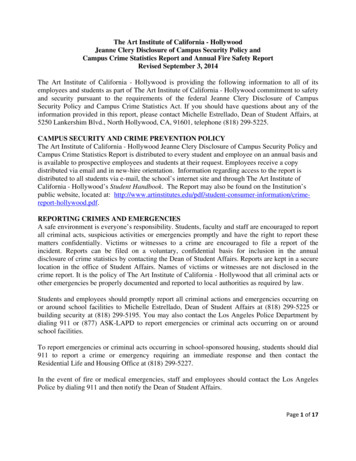
Transcription
The Art Institute of California - HollywoodJeanne Clery Disclosure of Campus Security Policy andCampus Crime Statistics Report and Annual Fire Safety ReportRevised September 3, 2014The Art Institute of California - Hollywood is providing the following information to all of itsemployees and students as part of The Art Institute of California - Hollywood commitment to safetyand security pursuant to the requirements of the federal Jeanne Clery Disclosure of CampusSecurity Policy and Campus Crime Statistics Act. If you should have questions about any of theinformation provided in this report, please contact Michelle Estrellado, Dean of Student Affairs, at5250 Lankershim Blvd., North Hollywood, CA, 91601, telephone (818) 299-5225.CAMPUS SECURITY AND CRIME PREVENTION POLICYThe Art Institute of California - Hollywood Jeanne Clery Disclosure of Campus Security Policy andCampus Crime Statistics Report is distributed to every student and employee on an annual basis andis available to prospective employees and students at their request. Employees receive a copydistributed via email and in new-hire orientation. Information regarding access to the report isdistributed to all students via e-mail, the school’s internet site and through The Art Institute ofCalifornia - Hollywood’s Student Handbook. The Report may also be found on the Institution’spublic website, located at: information/crimereport-hollywood.pdf.REPORTING CRIMES AND EMERGENCIESA safe environment is everyone’s responsibility. Students, faculty and staff are encouraged to reportall criminal acts, suspicious activities or emergencies promptly and have the right to report thesematters confidentially. Victims or witnesses to a crime are encouraged to file a report of theincident. Reports can be filed on a voluntary, confidential basis for inclusion in the annualdisclosure of crime statistics by contacting the Dean of Student Affairs. Reports are kept in a securelocation in the office of Student Affairs. Names of victims or witnesses are not disclosed in thecrime report. It is the policy of The Art Institute of California - Hollywood that all criminal acts orother emergencies be properly documented and reported to local authorities as required by law.Students and employees should promptly report all criminal actions and emergencies occurring onor around school facilities to Michelle Estrellado, Dean of Student Affairs at (818) 299-5225 orbuilding security at (818) 299-5195. You may also contact the Los Angeles Police Department bydialing 911 or (877) ASK-LAPD to report emergencies or criminal acts occurring on or aroundschool facilities.To report emergencies or criminal acts occurring in school-sponsored housing, students should dial911 to report a crime or emergency requiring an immediate response and then contact theResidential Life and Housing Office at (818) 299-5227.In the event of fire or medical emergencies, staff and employees should contact the Los AngelesPolice by dialing 911 and then notify the Dean of Student Affairs.Page 1 of 17
VICTIM NOTIFICATIONThe Art Institute will, upon written request, disclose to the alleged victim of a crime of violence, ora non--forcible sex offense, the report on the results of any disciplinary proceeding conducted byThe Art Institute against a student who is the alleged perpetrator of such crime or offense. If thealleged victim is deceased as a result of such crime or offense, the next of kin of such victim shallbe treated as the alleged victim for these purposes.POLICIES FOR PREPARING THE ANNUAL DISCLOSURE OF CRIMINALSTATISTICSAll incidents are reported and documented on the Incident Report which is sent to the Dean ofStudent Affairs. Reports are kept in a secure location in the office of Student Affairs. The annualcrime report is prepared by gathering campus crime statistics and data from local and state policeand sheriff departments and other relevant information by the Dean of Student Affairs.SECURITY AND ACCESS TO THE INSTITUTEIt is the policy of The Art Institute that access to all campus facilities, including school-sponsoredhousing facilities, be limited to authorized personnel, students and invited visitors. Visitors are at alltimes subject to school policies and conduct codes. Students and employees are responsible for theconduct of their guests at all times. Students, staff and faculty are required to show their valid ArtInstitute identification card to gain access to campus facilities on services and may be subject tosearch.ACCESS TO ACADEMIC BUILDINGSThe school security desk is located on the first floor entrance to the 5250 building. A security guardmonitors the building via security cameras. An additional security guard patrols the building facilityand parking structure. The security guard stationed at the entrance of the school building requires allstudents, staff, and faculty to present an identification card and requires guests to sign in on asecurity log. Exterior lighting is provided around the building, and parking areas. Suspiciouspersons are questioned and may be asked to leave. Building security inspects all floors beforelocking the building when the school closes.ACCESS TO RESIDENTIAL FACILITIESSchool-sponsored housing facilities have exterior lighting illuminating the grounds and parking lotsand each unit has individual keys. All complex parking lots are enclosed and secure and thecomplex premises are gated or locked at all times. We are currently located in multiple housingproperties and security staffing varies by complex. The Los Angeles Police Department can bereached by dialing (877) ASK-LAPD. In the event of a crime in progress, dial 911.Student residents living in school-sponsored housing should contact a Residence Assistant on-callfor their housing complex should an emergency arise. Resident Assistants are student leaders forthe campus who can direct and guide other students to the established emergency procedures. TheResidence Assistants are employees of The Art Institute and are trained in emergency procedures,housing and college regulations.CAMPUS LAW ENFORCEMENTSPersons employed as security personnel on the main campus, 5250 Lankershim Blvd., NorthPage 2 of 17
Hollywood, Ca 91601, are instructed in security, security problems, specific college rules andregulations, and the proper procedures of how to enforce them. These procedures and rules andregulations are reviewed periodically to ensure that security needs are being met. Security personnelon campus report directly to Facility Manager, 213-798-3658.Unarmed security personnel at the college are there at the direction of the college, and are to assiststudents, faculty and staff of The Art Institute. Someone is on duty during the hours the building isoccupied. They are responsible for ensuring that persons entering the building are employees, students,and their families or invited guests. They are authorized to request identification from thoseindividuals, who are unfamiliar to them, and identification is required of all individuals arriving orleaving after the building is secured. They have the authority to evict unauthorized persons from thepremises. Students are advised to carry their Art Institute Photo ID card at all times and to present themupon request. Security personnel may not make arrests, but are instructed to promptly contact the LosAngeles Police Department – North Hollywood Community Police Station and the Dean of StudentAffairs if any illegal activity occurs.Campus Security Authorities at the Art Institute include police officers, security officers and anyofficial of the institution who has significant responsibility for student and campus activities, includingstudent discipline, student judicial affairs and student life. The president or his designee may identifyother officials as it is deemed necessary. The Art Institute Campus Security Authorities are:TitlePhonePost CommanderFacilities ManagerDean of Student AffairsDirector of HousingStudent Support CoordinatorResidential Life 8-299-5237818-299-5229818-299-5227All members of the campus community are encouraged to report crimes or criminal activity to campussecurity at (818) 299-5195. This list of Campus Security Authorities is subject to modification, and isnot intended to be all inclusive due to changes in responsibilities within the Institution.Student residents living in school-sponsored housing should contact a Resident Assistant on-call fortheir housing complex or dial 911 should an emergency arise. The Resident Assistants are employeesof The Art Institute and are trained in emergency procedures and college regulations.In accordance with the Clery Act regulations, Campus “Pastoral Counselors” and Campus“Professional Counselors”, when acting as such, are not considered to be a campus securityauthority and are not required to report crimes for inclusion into the annual disclosure of crimestatistics. The Institution contracts with Talk One-2-One, a free service, which providesconfidential professional counseling via the telephone 24 hours per day, 7 days a week, at 1- 888617-3362. A comprehensive student assistance support Web site can be accessed via:https://studentassistance.artinstitutes.edu or via the student portal site.The Talk One-2-One counselor may refer a student for limited visits with an area network mentalhealth provider or assist the student with locating resources within the community. As a matter ofPage 3 of 17
policy, the counselors are encouraged; if and when they deem it appropriate, to inform personsbeing counseled of the procedures to report crimes on a voluntary, confidential basis for inclusioninto the annual crime statistics. Please contact the Dean of Student Affairs at (818) 299-5225 toconfidentiality report a crime.If a student is a victim of a crime and does not want to pursue action with The Art Institute’s systemor the criminal justice system, the student still may want to consider making a confidential report.With the student’s permission, the Dean of Student Affairs can file a report on the details of theincident without revealing the student’s identity. The purpose of the confidential report is tocomply with the student’s wish to keep the matter confidential, while taking steps to ensure thesafety of the student and that of others. Reports filed in this manner are counted and disclosed inthe annual crime statistics for The Art Institute. Reports are kept in a secure location in the office ofStudent Affairs.The Student Affairs Department conducts quarterly outreach and individual well-being workshopsfor you that are designed to increase awareness in areas such as diversity, safety, health andwellness.For additional information on Student Support Services, please contact the Student AffairsDepartment at (818) 299-5227.The Art Institute maintains a Daily Crime Log of all criminal incidents reported to the institution. TheDaily Crime Log includes the date and time the incident occurred, the nature of the offense, thelocation of the offense and the offense allegedly committed. The Daily Crime Log is available forpublic inspection in the Student Affairs Department during normal business hours.RELATIONSHIPS WITH LOCAL AND STATE POLICEThe Art Institute of California - Hollywood is located in the City of North Hollywood in the Countyof Los Angeles. The Art Institute of California - Hollywood maintains a working relationship withthe Los Angeles Police Department with contact initiated by The Art Institute of California Hollywood personnel to ensure that The Art Institute of California Hollywood is aware of criminaloffenses and arrests occurring on or near the campus so that they can be properly reported, and ifnecessary, provide for timely warning reports on crimes that represent a continuing threat.TIMELY WARNINGSTimely warnings are provided to give students, faculty, and staff notification of crimes that haveoccurred on the institution’s geographic area and have been reported to campus security authoritiesor to local police agencies and are considered by the institution to represent a serious or continuingthreat to students and employees. Timely warnings are not limited to violent crimes or crimesagainst person, but may be threats to persons or to property. For example, there may be a rash ofburglaries or motor vehicle thefts that merit a warning because they represent a continuing threat tothe campus community.The decision to issue a timely warning is based on the nature of the crime, the continuing danger tothe campus community, and the possible risk of compromising law enforcement efforts. The timelywarning should allow the members of the campus community protect themselves. Timely warningPage 4 of 17
reports are provided to the campus community in a variety of ways so that the warning will be ableto reach the entire campus community. The timely warning includes information about the crimethat triggered the timely warning and all information that will promote safety and that would aid inthe prevention of similar crimes. Once The Art Institute determines the content of the warning,timely warning reports are provided through a variety of mechanisms, including the emergencynotification tool ‘My Campus Alert’, the student portal site, the school website, email, posters,letters and flyers and digital signage.PROGRAMS TO INFORM STUDENTS ABOUT CAMPUS SECURITYAll new Art Institute employees and students are instructed on crime awareness, prevention andcampus security during orientation, and are encouraged to take responsibility for their own security, aswell as the security of their fellow classmates. During the New Student Orientation process newstudents receive information on campus security policies and procedures, suggestions on how to avoidbecoming a crime victim, evacuation plans at the main campus and at school-sponsored housing, andprocedures for reporting any criminal activity or emergency. Students in school-sponsored housing aregiven the names and phone numbers of the Resident Assistant, who live on the premises or are on-call,in case of an emergency. The Director of Residential Life & Housing discusses first aid and safety atorientation and quarterly housing meetings. The program encourages students and employees to beresponsible for their own security and the security of others. Art Institute Dean of Student Affairs, aswell as Residential Life & Housing, encourage victims or witnesses to report crimes on a voluntary,confidential basis for inclusion in the annual disclosure of crime statistics. However, the names ofvictims or witnesses who provide information on criminal offenses are not disclosed in the annualdisclosure of crime statistics and are maintained by The Art Institute in a secure location.In an emergency, The Art Institute My Campus Alert System will inform members of The ArtInstitute community about emergency situations through alternate communication formats inaddition to college email, telephones, or building alarms. The My Campus Alert System cantransmit short notifications by email to any outside email address, by text message to a cell phone,or by voice message to an off-campus cell phone or telephone anywhere in the U.S, as well as to oncampus email addresses and telephones. The messages are initiated by a member of the college’scrisis communication team only when required for safety purposes.Information regarding registration for the My Campus Alert System is available under the section ofthe Clery Report titled “Emergency Notification” and in the Student Affairs office. Every studentcan update their My Campus Alert System contact preference via the student portal homepage.Students can do this via the button entitled ‘Update Profile / My Campus Alert’.PROGRAMS TO INFORM STUDENTS AND EMPLOYEES ABOUT THE PREVENTIONOF CRIMESThe Art Institute also provides seminars and workshops designed to heighten awareness of crime andits prevention. Topics included in these informational programs are personal safety, living in a city,crime prevention, basic safety, and neighborhood watch programs. In addition to the annual campussecurity report, students and staff are notified of specific security concerns as they arise throughout theyear.Page 5 of 17
In the event The Art Institute, working with local police and/or campus security personnel, determinesthat a particular criminal offense continues to be a threat to the campus community, it will notify thecampus community by email, letters and handbills, posters, digital signage and the student portal site.Incidents occurring at The Art Institute student housing locations are announced by the distribution ofnotices to each student apartment.Students are requested to review The Art Institute's Student Handbook where sections discussingCrime Awareness and Campus Security and Student Conduct Policy can be found. Employees arerequested to review The Art Institute's Employee Handbook where information regarding Standards ofConduct and Safety can be found.Notification of emergencies requiring immediate action or evacuation are disseminated via the MyCampus Alert Emergency Notification System.OFF-CAMPUS STUDENT ORGANIZATIONSAt the present time, The Art Institute does not have any off-campus student organizations.DRUG AND ALCOHOL POLICIESIn keeping with section 120(a) through (d) of The Higher Education Act of 1965, as amended,including the Drug-Free Schools and Communities Amendments of 1989 (Public Law 101-226), a“Drug Free Schools and Campuses” publication, the Drug Prevention Policy, is provided to all ArtInstitute students and employees annually.Pursuant to federal and state drug laws, employees and students are prohibited from the unlawfulmanufacture, distribution, possession, sale or use of illicit/illegal drugs. The Art Institute alsoenforces state laws regarding underage drinking. This prohibition applies while on the property ofThe Art Institute or when participating in any institutional activity. Students or employees whoviolate this policy will be subject to disciplinary action up to, and including, expulsion from The ArtInstitute or termination of employment.For more information please refer to the Drug and Alcohol Prevention Program and the Drug-FreeWorkplace and Campus d.pdfWEAPONS POLICYPossession or use of firearms, fireworks, ammunition, or other dangerous weapons or materials isprohibited on Art Institute owned or controlled property, at college-sponsored activities, and inschool-sponsored housing.PROGRAMS AND PROCEDURES REGARDING SEXUAL VIOLENCESexual Violence, including Domestic Violence, are prohibited by the Institution and areincompatible with the Institution’s goal of providing a healthy educational environment forstudents, faculty, staff and guests. Sexual offenses involve the physical contact of a sexual naturewhich is against one’s will or without one’s consent. Consent requires a voluntary, positiveagreement between the participants to engage in specific sexual activity. Sexual activity that isnonconsensual would include, but is not limited to:Page 6 of 17
nonconsensual sexual intercourse or penetration (vaginal, oral, or anal) by any means;nonconsensual sexual contact (any touching of intimate body parts with any body part orobject without consent);sexual contact with a person while knowing or having reason to know that the person isincapacitated by any means including alcohol or other drugs.Sexual violence can be perpetrated by a stranger or acquaintance. Both men and women can bevictims or perpetrators. Domestic Violence is defined as a pattern of abusive behavior in any relationship that isused by one partner to gain or maintain power and control over another intimate partner.Domestic violence can be physical, sexual, emotional, economic, or psychological actions orthreats of actions that influence another person. This includes any behaviors that intimidate,manipulate, humiliate, isolate, frighten, terrorize, coerce, threaten, blame, hurt, injure, orwound someone. Domestic violence includes but is not limited to any abusive, violent,coercive, forceful, or threatening act or word inflicted against the victim by the victim'scurrent or former spouse, current or former cohabitant, or a person similarly situated underdomestic or family violence law, or anyone else protected under domestic or family violencelaw. Dating Violence-includes offense committed against a victim who has been in a socialrelationship of a romantic or intimate relationship with the victim. Stalking is a course of conduct directed at a specific person that would cause a reasonableperson to fear for his, her, or others' safety, or to suffer substantial emotional distress.Educational programs promoting the prevention and awareness of rape, acquaintance rape, and other sexoffenses have been provided to all students and employees via campus staff members and guest presentersthroughout the year. Beginning in September 2014, this training will be presented via an online LearningManagement System (LMS) module. All training methods discuss rape awareness, reducing the risk of being arape victim, and what to do if you are attacked. The LMS program also addresses the prevention of domesticviolence, dating violence, sexual assault, and stalking. Bystander intervention is part of the educationalprogram and tips for intervening are described. For instance, in a situation involving sexual assault,relationship violence, or stalking, a bystander should minimize risk and: Approach everyone as a friend; Not be antagonistic; Avoid violence; Be honest and direct whenever possible; Recruit help, if possible; Keep safe; and If things get out of hand, contact the police.Brochures on sexual assault issues are available in the Student Affairs Department should a student oremployee report to the institution that he or she has been a victim of domestic violence, datingviolence, sexual assault, or stalking . It is the student(s) option to notify the appropriate lawenforcement authorities, including on-campus authorities and local police. At the student’s request,Student Support Coordinator or other Art Institute officials will assist in notifying the properauthorities. Victims of sexual assault or rape should follow these recommended steps:Page 7 of 17
Go to a safe place following the attack.Do not shower, bathe, or destroy any of the clothing you were wearing at the time of the attack.It is important that evidence be preserved for proof of a criminal offense.Go to a hospital emergency room for medical care.Make sure you are evaluated for the risk of pregnancy and venereal disease. (A medicalexamination is the only way to ensure you are not injured and it could provide valuableevidence should you decide to prosecute.)Call someone to be with you; you should not be alone.It is also recommended that victims call the Los Angeles Rape and Battery Hotline at (213) 6263393, (310) 392-8381 or (626) 793-3385. It is open 24 hours a day and their counselors can helpanswer medical and emotional questions at any hour and in complete confidence. Reporting the rape tothe police is up to the victim, but it is important to remember that reporting a rape is not the same asprosecuting a rape. Victims are strongly encouraged to call the police and report the rape. If the victimrequests, the Art Institute staff will assist the victim in notifying law enforcement authorities. If thevictim needs additional counseling services beyond those identified below, The Art Institute staff willassist in identifying off-campus counseling or mental health services.If the victim does not want to pursue action with The Art Institute’s system or the criminal justicesystem, the student still may want to consider making a confidential report. With the student’spermission, the Dean of Student Affairs, can file a report on the details of the incident withoutrevealing the student’s identity. The purpose of the confidential report is to comply with the student’swish to keep the matter confidential, while taking steps to ensure the safety of the student and that ofothers.After any campus sexual assaults are reported, the victims of such crimes have the right to request thatArt Institute personnel take steps or actions reasonably feasible to prevent any unnecessary orunwanted contact or proximity with alleged assailants, including relocation in school-sponsoredhousing, if applicable or the transfer of classes. Victims will receive written notification about optionsfor, and available assistance, in changing academic, living, transportation, and working situations, if sorequested by the victim.Other rape crisis centers or mental health agencies available to assist a victim of sexual offensesinclude:1. California Hospital Medical Center, (213) 748-24112. Valley Trauma Center (818) 886-04533. Los Angeles City Attorney Victim/Witness Assistance Program (818) 623-40564. Boys and Girls Town National Abuse Hotline, (800) 843-52005. Domestic Violence-Sexual Assault Hotline, (800) 339-39406. Rape, Abuse & Incest National Network (RAINN) at 1-800-656-HOPE7. Santa Monica Rape Treatment Center, (310) 319-4000Written notification to students and employees about their rights and options regarding existingcounseling, health, mental health, victim advocacy, legal assistance, and other services available forvictims both on-campus and in the community will be provided.Page 8 of 17
PROCEDURES TAKEN BY THE ART INSTITUTE ONCE SEXUAL ASSAULT, DATINGVIOLENCE, DOMESTIC VIOLENCE, OR STALKING HAS BEEN REPORTED;DISCIPLINARY ACTION AND SANCTIONSUpon learning of possible sexual violence involving a student, regardless of whether the victimchooses to report the incident to law enforcement, the Art Institute will take immediate action toinvestigate or otherwise determine what happened. Such action may include, but is not limited to,speaking with the alleged victim, the alleged perpetrator and other potential witness as appropriateand reviewing other evidence if available. The standard of evidence that will be used ispreponderance of the evidence. This is a burden of proof in which it is determined to be more likelythan not, or at least 51% certain, that the violation has in fact occurred.If the Art Institute determines that sexual violence may have occurred, the Institution will take stepsproactively designed to promptly and effectively end the sexual violence or the threat of sexualviolence, prevent its recurrence, and address its effects regardless of whether the alleged actions aresubject to criminal investigation.On-campus disciplinary procedures against students will be in accordance The Art Institute publishedStudent Conduct Policy, which are prompt, fair, and impartial. The Dean of Student Affairs willconduct the disciplinary proceeding and will receive annual training related to domestic violence,dating violence, sexual assault, and stalking as well as how to conduct an investigation and hearingprocess that protects the safety of victims and promotes accountability. Both the accuser and theaccused are entitled to have others present during a disciplinary proceeding. Both will besimultaneously informed, in writing, of the outcome of any campus disciplinary proceeding as well asany procedures for appeal. For this purpose, the outcome of a disciplinary proceeding means only TheArt Institute’s final determination with respect to the alleged sexual offense and any sanction that isimposed against the accused. Sanctions, which may be imposed following a final determination of anydisciplinary proceeding, including rape, acquaintance rape, or other forcible or non-forcible sexoffenses, may include warning, probation, suspension or dismissal.INFORMATION REGARDING REGISTERED SEX OFFENDERSInformation regarding registered sex offenders under section 170101 (j) of the Violent CrimeControl and Law Enforcement Act of 1994 is available from the California’s Department ofJustice’s Web site at http://www.meganslaw.ca.gov/ this site provides information to the publicconcerning the location of sex offenders within California. On-campus computer labs with Internetaccess are available for you to view the above Web site at 5250 Lankershim Blvd., NorthHollywood, Ca 91601 on Monday – Thursday from 6 a.m. – 12 a.m. and on Saturday from 6 a.m. to10 p.m.To comply with the mandated portion of California’s Megan’s Law, all city police and sheriffagencies serving a population of 200,000 or more are required to make Megan’s Law WebApplication available for viewing information about registered sex offenders. You may access theinformation at the following locations:Los Angeles Police Department – North Hollywood Community Police Station11640 Burbank Blvd.North Hollywood, CA 91601(818) 623-4016Page 9 of 17
Los Angeles Police Department – Olympic Division1130 S. VermontLos Angeles, CA 90006 213-382-9102Los Angeles Police Department - Wilshire Division4861 West Venice BoulevardLos Angeles, CA 90019(213) 485-4022Los Angeles Police Department - Rampart Division2710 West Temple StreetLos Angeles, CA 90026(213) 485-9122CRIME STATISTICSStatistics are provided for your information in compliance with the Jeanne Clery Disclosure ofCampus Security Act and Campus Crime Statistics Act. The Art Institute prepares the crime statisticpolicies annually by gathering all reported data and preparing a report for its employees andstudents. Moreover, local/state police agencies are contacted by the Dean of Student Affairs tomaintain a working relationship and formulate statistics for the annual crime statistics report. Thechart includes statistics available to The Art Institute concerning the occurrences on The ArtInstitute's campus, noncampus building(s) or property(ies), and on public property,
5250 Lankershim Blvd., North Hollywood, CA, 91601, telephone (818) 299-5225. CAMPUS SECURITY AND CRIME PREVENTION POLICY The Art Institute of California - Hollywood Jeanne Clery Disclosure of Campus Security Policy and Campus Crime Statistics Report is distributed to every student and employee on an annual basis and


